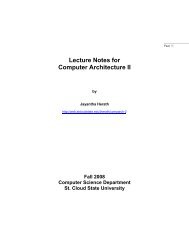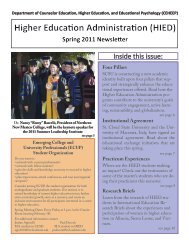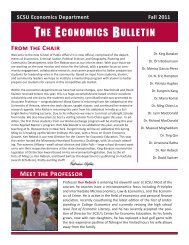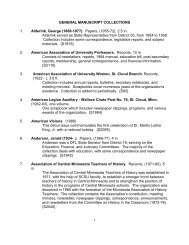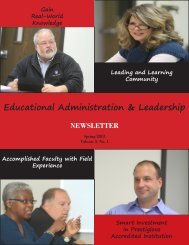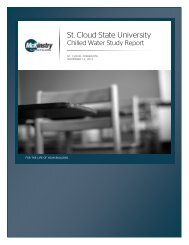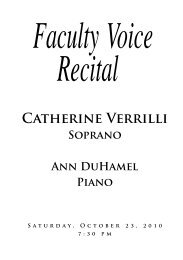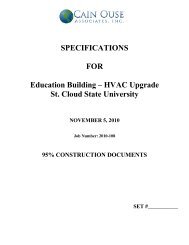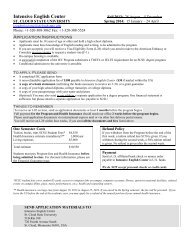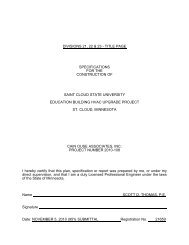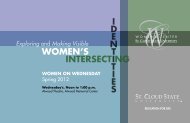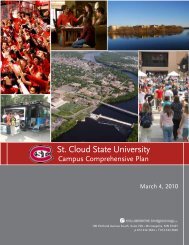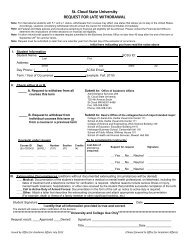2008 Proceedings - St. Cloud State University
2008 Proceedings - St. Cloud State University
2008 Proceedings - St. Cloud State University
Create successful ePaper yourself
Turn your PDF publications into a flip-book with our unique Google optimized e-Paper software.
Abstracts<br />
Session Y Special Education South Glacier<br />
Transition Planning<br />
The Individuals with Disabilities Education Act (IDEA) mandates transition planning for special education students, to ensure their smooth<br />
transition from school to adult roles. Areas that may be addressed during the transition planning process include post-secondary education<br />
or vocational training, employment, independent living, community participation and recreation/leisure. This session will focus on transition<br />
services that have proven successful in preparing students with disabilities for employment. We will address the needs of students in all<br />
disability areas, with specific focus on measures that could improve the post-school success of students with Emotional and Behavioral<br />
Disorders.<br />
Presentation Index: Y3<br />
Time: 4:10 p.m.<br />
Department: Special Education<br />
Project Sponsor(s):<br />
<strong>St</strong>udent Presenter(s): Janssen, Melissa; Klever, Heather; Barth, Britta;<br />
Wilkins, Julia<br />
Grunewald, Jennifer; Haider,Cindee<br />
Session Z Ethnic <strong>St</strong>udies Oak<br />
Latino Immigration Issues in Central Minnesota<br />
A Minnesota state demographer recently noted that in terms of the growth of Latino populations, the potential outlook of the entire state in<br />
10 years will be similar to the Central Minnesota town of Willmar. Latinos currently comprise 25% of Willmar‘s population, and for many<br />
other areas and towns in Central Minnesota the future is already here. The tremendous growth of the Latino population in Minnesota has<br />
been largely fueled by immigration. This panel of student investigators will present their research on Latino immigrant issues in Central<br />
Minnesota. The following topics will be addressed by the presenters: An examination of the current laws and services that are available<br />
(and applicable) for the protection of battered immigrant women; Examining the extent of need among undocumented students for out-ofstate<br />
tuition fee-waivers to attend SCSU or any other institution of higher education; Latino immigrant perception of discrimination by<br />
service providers; The extent of Spanish language loss among Latino immigrant families; Examining the insufficient and inadequate<br />
housing that is faced by a growing population of Latino immigrants; Assessing barriers and obstacles facing Latino immigrants in higher<br />
education.<br />
Presentation Index: Z1<br />
Time: 3:30 p.m.<br />
Department: Ethnic <strong>St</strong>udies<br />
Project Sponsor(s):<br />
<strong>St</strong>udent Presenter(s): Chavarria, Hector; Gomez, Angelica; Jacobs, Megan;<br />
Casanova, <strong>St</strong>ephen<br />
Hernandez, Evelyn; Ochoa,Walter; Smith, John<br />
Session ZA Behavioral Science Granite<br />
The <strong>St</strong>atus of the Kurdish Language in the Middle East<br />
Although the Kurdish language is one of the top languages of the world in terms of the number of speakers, it is among the most<br />
repressed. The Kurdish language belongs to the western sub-group of the Iranian languages, which themselves belong to the Indo-Iranian<br />
branch of the Indo-European language family. The speech community is divided among five neighboring countries (Iran, Iraq, Syria,<br />
Turkey, Armenia), and dispersed in a vast Diaspora throughout the world. Today, Kurdish is an official language in Iraq, while it is banned<br />
in Syria, where it is forbidden to publish material in Kurdish. A few years ago, the Turkish government placed severe restrictions on the use<br />
of Kurdish, prohibiting the language in education and broadcast media. In Iran, though it is used in some local media and newspapers, it is<br />
forbidden in schools. In my paper, I will talk in detail about the status of the Kurdish language in Syria, Iraq, Iran and Turkey. Moreover, I<br />
did a survey on the attitude of Arabs in the USA towards Kurdish and the Kurds in general. I also included one Turkish student. In<br />
summary, I found that the attitude towards the Kurdish language was not as negative as I expected, and all participants would not<br />
discriminate a Kurd in the job market. I could not find any correlation between country and attitude except the Turkish citizen who had a<br />
very negative attitude. There was one correlation: those who felt that Arabic was threatened opposed a bilingual education for Kurds. The<br />
limitation of the study was the fact that I only interviewed educated people, and Arab Americans were surely influenced by ―American‖<br />
values such as tolerance and equality.<br />
Presentation Index: ZA1<br />
Time: 3:30 p.m.<br />
Department: English<br />
Project Sponsor(s):<br />
<strong>St</strong>udent Presenter(s): Naheel, Rihab<br />
Koffi, Ettien<br />
<strong>St</strong>. <strong>Cloud</strong> <strong>St</strong>ate <strong>University</strong> <strong>St</strong>udent Research Colloquium 72<br />
April 22, <strong>2008</strong>




